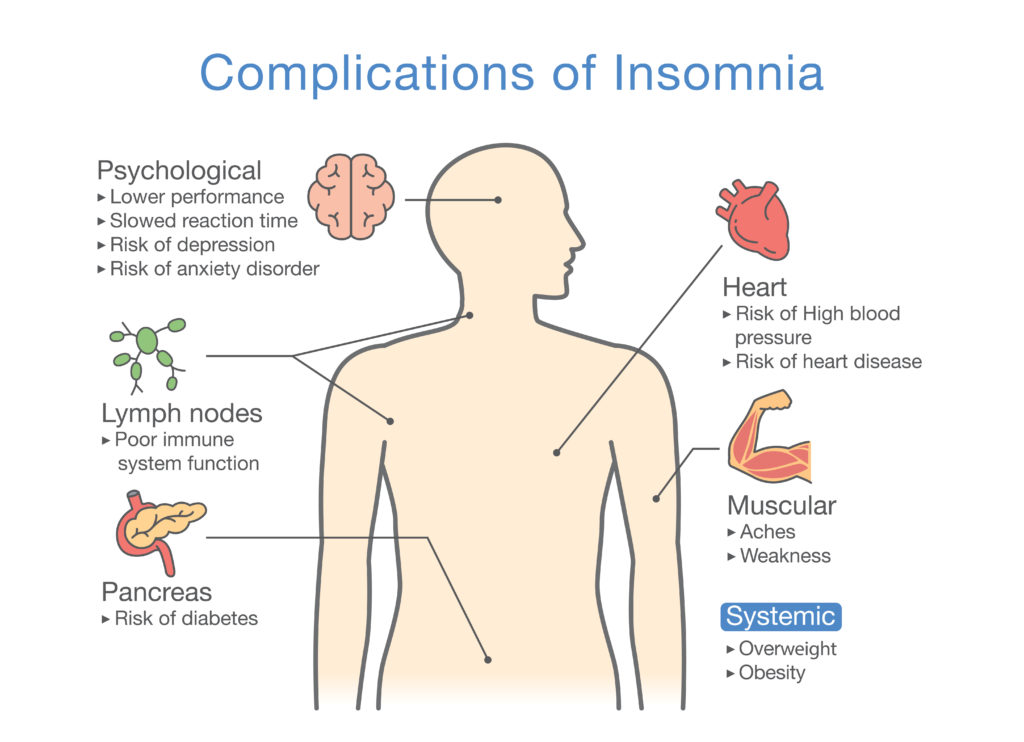The U.S. Food and Drug Administration (FDA) announced last week that certain insomnia medications will now feature a boxed warning. The FDA uses this type of warning, also known as a black box warning, on the label of prescription drugs to call attention to serious or life-threatening risks. The “black box” refers to the actual black square that appears on the prescription label. This label is designed to call attention to the warning and hopefully communicate to consumers the seriousness of the potential risk.
Insomnia Medications with New Boxed Warning
For the millions of Americans who struggle with getting enough sleep, prescription medications can provide much-needed relief. However, in their newest boxed warning, the FDA is advising consumers that serious injuries can occur in association with the use of certain common prescription sleep aids.
The medications with the boxed warning are:
- Lunesta (eszopiclone)
- Sonata (zaleplon)
- Ambien, Ambien CR, Edluar, Intermezzo, Zolpimist (zolpidem)
Physicians most often prescribe the above medications for people who have difficulty falling asleep and staying asleep (insomnia). These medications are in a class called sedative-hypnotics, and have been available for purchase in the American pharmaceutical marketplace for decades.
The Risks that Prompted the Boxed Warning
The injuries that have occurred due to these insomnia medications are described as rare. However, the risks are clearly serious enough to prompt the FDA to take action and issue this boxed warning. Because these medications slow down brain activity and allow insomnia sufferers to remain in a deep state of sleep, certain risky sleep behaviors have occurred and have caused injury.
The FDA has received reports of consumers:
- Injuring themselves while sleepwalking
- Sleep driving
- Engaging in other potentially dangerous activities while not fully awake
Currently, there are reports that 20 people have died engaging in these risky sleep behaviors while taking insomnia medication. Numerous others have suffered injuries.
Pharmaceutical drugs of this class regularly cause decreased alertness and impaired driving. Drowsiness is a common side effect listed in the drug labels of all insomnia medications. However, the risky sleep behaviors that are the subject of this boxed warning involve patients saying or doing things and having no memory of the event afterward. The consequences of acting while unconscious are frightening to imagine.
Who Will be Affected by this Boxed Warning?
According to the FDA, more than 30 million Americans filled prescriptions for insomnia medications in this class in 2018. The new boxed warning includes a contraindication, which means a specific warning to healthcare workers not to prescribe this medication to patients who have exhibited risky sleep behaviors in the past.
In short, if you have a history of sleepwalking, sleep driving, or doing anything else in your sleep the FDA is warning that this medication is no longer for you. The risks are too great, and could possibly be fatal.
For all other patients, a boxed warning does not mean that you must stop taking the medication. Instead, the warning should be a factor that you and your healthcare provider take very seriously when determining your course of treatment. Make sure you report any adverse side effects with your doctor. Insomnia patients and their healthcare providers should carefully weigh the risks and benefits of dangerous or potentially fatal side effects before continuing treatment.
The FDA maintains that quality sleep is essential for good mental and physical health, and is not necessarily discouraging consumers from taking these medications at this time. Again, the purpose of the boxed warning is to make the dangers associated with this product abundantly clear to anyone who may be interested in taking them.
However, if you take these insomnia medications and you find that you are engaging in activities when not fully awake, such a sleepwalking or having conversations of which you have no memory, you should:
- Inform your healthcare provider of your risky sleep behaviors
- Stop taking the medication immediately
In its continuing efforts to monitor pharmaceutical drugs for safety and effectiveness, the FDA is actively soliciting reports of adverse events associated with these insomnia medications. If you have experienced sleepwalking or have been doing things while not fully awake, contact the FDA MedWatch Safety Information and Adverse Event Reporting Program.
Facts About Insomnia
According to the American Academy of Sleep Medicine, about 30 percent of adults exhibit symptoms of insomnia. About 10 percent of adults suffer from chronic insomnia. Insomnia is a blanket term which can refer to:
- Difficulty initiating sleep
- Waking up frequently in the night
- Waking up too early and being unable to go back to sleep
- Poor quality sleep that does not leave you feeling refreshed
Middle-aged and elderly adults are more likely to suffer from insomnia than younger adults. Women are more likely to develop insomnia than men. Adults who suffer from illnesses, both mental and physical, are at risk for insomnia. People who suffer from depression are at a greater risk of insomnia.

Safety Tips for Patients who Take Insomnia Medication
Though the FDA’s warning about the risky sleep behaviors associated with these medications indicates the risk is slight, a boxed warning is the most serious type of warning the federal agency issues with regard to pharmaceutical products. If you take medication to manage your insomnia, it would be wise to take preventive steps to keep yourself safe in case you experience these risky sleep behaviors.
Try these tips:
- Keep your sleeping environment safe. Do not sleep in a room with harmful or sharp objects.
- Sleep in a room on the ground floor if possible.
- Lock your windows and doors while you sleep.
- Fiberglass windows with thick and heavy drapes to make them more difficult to break while you are unconscious.
- Place a bell or some other noisemaker on the door to your bedroom.
If you or a family member notices unusual sleeping behaviors, contact your healthcare provider right away.
Learn More by Talking to Product Liability Attorneys
A boxed warning indicates that the FDA still has faith in the product on the market, though there are concerns. The presence of a boxed warning does not shield pharmaceutical companies from responsibility if their products cause serious harm or death. The goal of a boxed warning is to help consumers be as informed as possible about known risks.
If you or someone you love has been harmed while engaging in risky sleep behaviors under the influence of insomnia medications, seek the advice of a skilled product liability attorney like those at Drug and Device Watch. Call our office today at 1-888-458-6825 or submit our contact form online to learn more.
Sources:
- https://www.fda.gov/safety/medwatch-safety-alerts-human-medical-products/certain-prescription-insomnia-medicines-new-boxed-warning-due-risk-serious-injuries-causedhtm_campaign=FDA%20MedWatch%20Certain%20Prescription%20Insomnia%20Medicines&utm_medium=email&utm_source=Eloqua
- https://www.fda.gov/drugs/drug-safety-and-availability/fda-adds-boxed-warning-risk-serious-injuries-caused-sleepwalking-certain-prescription-insomnia
- https://aasm.org/resources/factsheets/insomnia.pdf
- https://www.webmd.com/sleep-disorders/how-is-sleepwalking-treated
